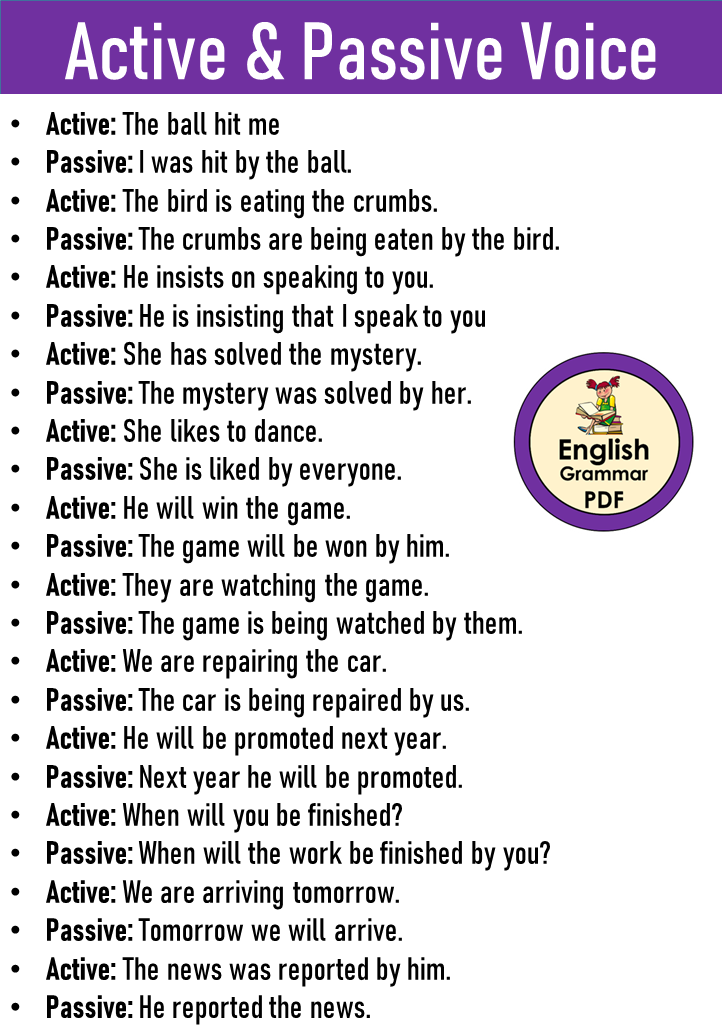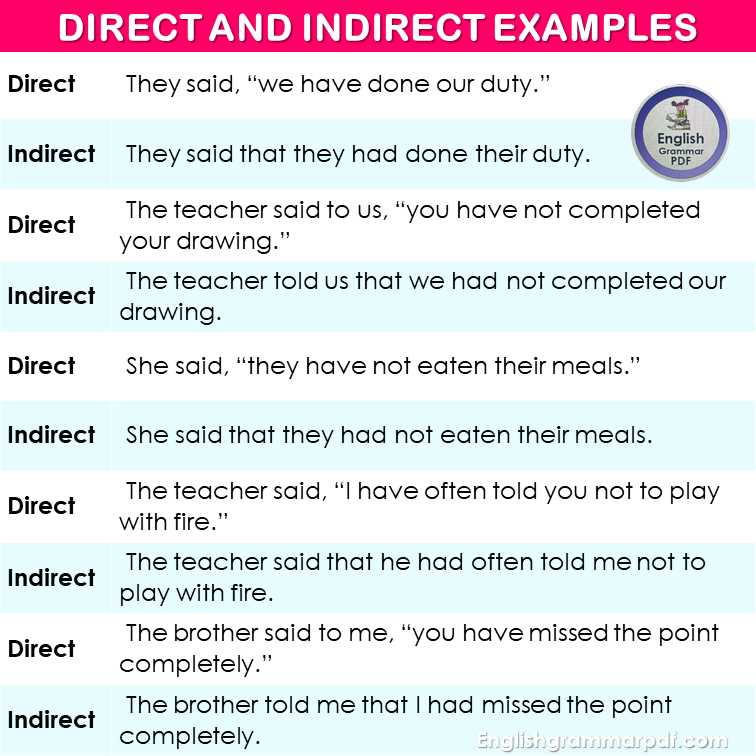100 Examples of Active and Passive Voice! What’s the difference between active and passive voice? In a nutshell, active voice is simple and direct, while passive voice is more complicated and wordy. But what does that mean in practice? Let’s take a look at some examples to see the difference.
Active and passive voice are two different ways to write sentences. In active voice, the subject performs the action of the verb. In passive voice, the subject is acted upon by the verb. The best way to understand active and passive voice is to see examples of each. English can be a difficult language to understand at times. There are many rules that seem to change depending on the situation. One such rule is the difference between active and passive voice. This blog post will provide some examples of each in order to help you better understand the difference.
Present Simple Tense
- Sara plays cricket.
- Cricket is played by Sara.
Present Continuous Tense
- Sara is playing cricket.
- Cricket is being played by Sara.
Present Perfect Tense
- Sara has played cricket.
- Cricket has been played By Sara.
Present Perfect Continuous Tense
- Sara has been playing cricket.
- Cricket has been being played by Sara.
- Sara played cricket.
- Cricket was played by Sara.
Past Continuous Tense
- Sara was playing cricket.
- Cricket was being played by Sara.
Past Perfect Tense
- Sara had played cricket.
- Cricket had been Played by Sara.
Past Perfect Continuous Tense
- Sara had been playing cricket.
- Cricket had been being played by Sara.
Future Indefinite Tense
- Sara will play cricket.
- Cricket will be played by Sara.
Future Continuous Tense
- Sara will be playing cricket.
- Cricket will be being Played by Sara.
Future Perfect Tense
- Sara will have played cricket.
- Cricket will have been Played by Sara.
Future Perfect Continuous Tense
- Sara will have been playing cricket.
- Cricket will have been being played by Sara.
Future to be going to
- Sara is going to play cricket.
- Cricket is going to be played by Sara.
- Sara must play cricket.
- Cricket must be played by Sara.
Modal Perfect
- Sara should have played cricket
- Cricket should have been played by Sara.
The Passive Voice is formed when the object of the verb is made into the subject, and the subject of the verb is made into a by the use of various auxiliary verbs and helping words.
Passive Voice examples:
- Cricket is played by Sara.
- Sara plays cricket.
- Cricket was played by Sara.
- Cricket has been played By Sara.
- Cricket is being played by Sara.
- Sara will play cricket.
- Sara will be playing cricket
- Cricket was being played by Sara.
- Cricket had been being played by Sara.
- Cricket will have been being played by Sara.
Passive voice is not really used much in English. Passive sentences are less direct than active ones, and who wants to be indirect? Still, sometimes it does have its place.
The passive voice is useful when the person or thing responsible for the action of the verb needs to be emphasized. For example: “Passports must be carried by all citizens.” In this sentence, the focus is on the fact that all citizens must carry their passports. The speaker’s opinion about who should be carrying around a passport is irrelevant.
The passive voice can also be used when you don’t know who performed the action of the verb: “An attack was made on the President in his hotel room.”
Another common use of the passive voice is to emphasize a noun or pronoun that is already known. For example: “I need a drink” sounds more immediate than “A drink is needed by me.”
Although it’s not as common, you can also form questions and negatives in the active voice with help from do or does and the present tense of the verb to be (am, is , or are).
For example:
- Who ate my sandwich?
- Was my sandwich eaten by someone?
- Did you eat my sandwich?
- Are any sandwiches being eaten at the moment?”
Examples of Active and Passive Voice

Active: The ball hit me.
Passive: I was hit by the ball.
Active: The bird is eating the crumbs.
Passive: The crumbs are being eaten by the bird.
Active: He insists on speaking to you.
Passive: He is insisting that I speak to you.
Active: She has solved the mystery.
Passive: The mystery was solved by her.
Active: They are building a new house on Main Street.
Passive: A new house is being built on Main Street.
Active: She likes to dance.
Passive: She is liked by everyone.
Active: He will win the game.
Passive: The game will be won by him.
Active: They are watching the game.
Passive: The game is being watched by them.
Active: We are repairing the car.
Passive: The car is being repaired by us.
Active: He will be promoted next year.
Passive: Next year he will be promoted.
Active: When will you be finished?
Passive: When will the work be finished by you?
Active: We are arriving tomorrow.
Passive: Tomorrow we will arrive. .
Active: The news was reported by him.
Passive: He reported the news.
Active: She bought her coat at that store.
Passive: That coat was bought by her at that store.
Active: By noon, they had worked for five hours on their project.
Passive: At noon, their project had been worked on for five hours by them.
Active: The car is being repaired by us.
Passive: We are repairing the car.
Active: He painted the fence last night.
Passive: The fence was painted by him last night.
Active: They are building a new house on Main St.
Passive: A new house is being built on Main St.
Active: Are all these shoes yours?
Passive: Are all these shoes being worn by you?
Active: Did you eat my sandwich?
Passive: Was my sandwich eaten by you?
Active: Who ate my sandwich?
Passive: My sandwich was eaten by someone.
Active: We are repairing the car.
Passive: The car is being repaired by us.
Active: Were these boxes delivered to our office?
Passive: Were our office delivered to these boxes?
Active: He has solved the mystery.
Passive: The mystery has been solved by him.
Active: They are watching the game.
Passive: The game is being watched by them.
Active: She has solved the mystery.
Passive: The mystery has been solved by her.
Active: When will you be finished?
Passive: By when will the work be finished by you?


